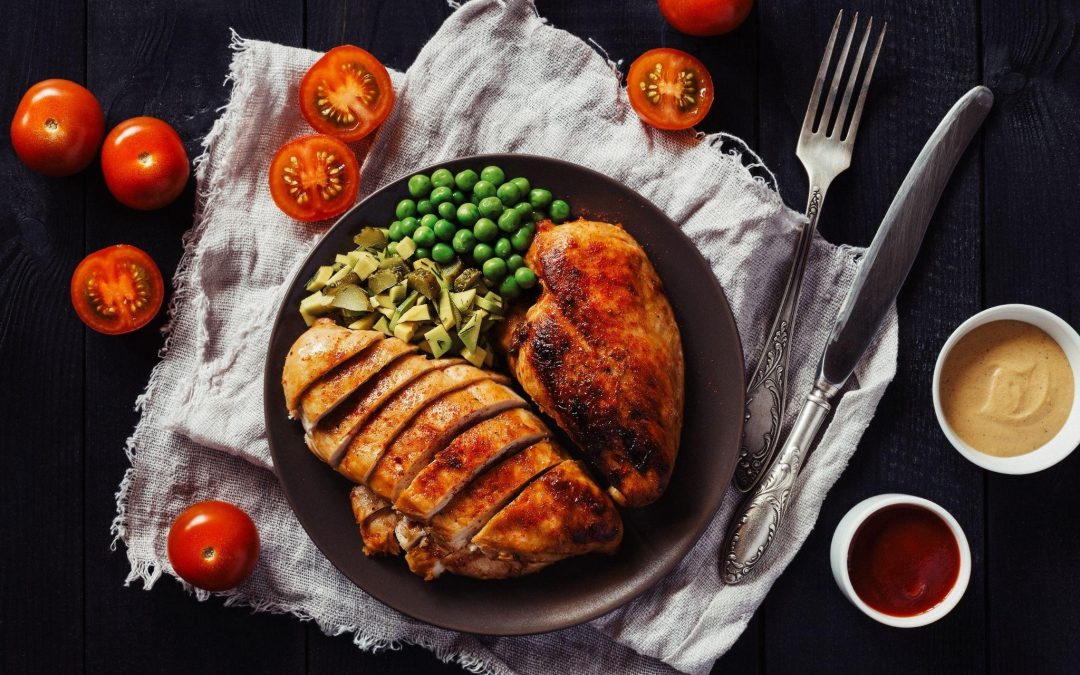Protein-Rich Foods to Add to Your Diet

Proteins are the building blocks of the body that help in the growth and repair of tissues and muscles. Amino acids digested from the protein provide structure to your bones, organs, hair, nails, and skin. Amino acids also help in creating enzymes and hormones in the body.

If you are physically active, a protein intake of 1.2 to 2.2 grams per kg of your body weight per day is suitable. An active healthy adult with a weight of 65 kg would need a protein intake of 65*1.2 to 2.2 = 78 to 130 grams daily.
1. Chicken breast
Per 100 gm – Protein: 25 gm | Carbs: 0 gm | Fat: 3 gm
Chicken breast makes for a great choice if you are trying to increase your protein intake. It is loaded with protein with no carbs and a small amount of fat.
Chicken breast is easy to cook. You can have it with a side of vegetables or add it to salads and soups.
2. Lamb/Mutton
Per 100 gm – Protein: 20 gm | Carbs: 0 gm | Fat: 2.4 gm
Mutton is a rich source of high-quality protein. It provides all the 9 essential amino acids needed for the body.
3. Fish
Fish is an excellent source of protein while being low in fat. Fish like salmon is slightly higher in fat content as compared to other varieties of fish but the presence of Omega-3 fatty acids makes it good for the heart. A 100 gms of raw fish would contain 18-25 gms of protein depending on the type of fish.
4. Prawns
Per 100 gm – Protein: 18 gm | Carbs: 2 gm | Fat: 2 gm
Prawns have a complete protein profile. It means that prawns contain all 9 essential amino acids needed by the body in the right proportion. It takes very less time to cook prawns and makes for a good source of protein to add to your diet.
5. Soya chunks
Per 100 gm – Protein: 54 gm | Carbs: 36 gm | Fat: 2 gm
For vegetarians looking to bump their protein intake, soya chunks are an exceptional alternative to meats and seafood.
6. Egg whites
Per 100 gm – Protein: 11 gm | Carbs: 1 gm | Fat: 0 gm
Egg white is the thick liquid part of the egg that surrounds the yellow-colored yolk. 90% of egg white is water and the rest is protein. Egg whites are also a complete protein with all 9 amino acids. For people trying to lose weight, egg whites are great because of negligible fat content and lower calories as compared to the whole egg.
7. Whey protein
1 scoop – Protein: 25 gm | Carbs: 3 gm | Fat: 2 gm
Whey protein powder is a convenient way to add protein to your diet. You can add it to shakes, smoothies or yogurt. The protein content will vary depending on the type of whey and brand you are buying. Whey protein is of 3 types: Whey concentrate, isolate and hydrolysate. Read our blog to know the difference between different types of whey protein.
Read more: Whey Concentrate, Isolate, Hydrolysate – Know the Difference
8. Tofu
Per 100 gm – Protein: 9 gm | Carbs: 3 gm | Fat: 4 gm
As tofu is made from soy milk, tofu also contains all the essential amino acids needed in your body for growth and repair. You can cook tofu in multiple ways as it is a versatile ingredient.
9. Curd/Yogurt
Per 100 gm – Protein: 4 gm | Carbs: 4 gm | Fat: 3 gm
Curd is a good source of protein and it is an easily available food item. 20% of the protein in curd is whey and 80% is casein. The fat content of the curd will depend on the kind of milk it is made from.
10. Paneer
Per 100 gm – Protein: 18 gm | Carbs: 3 gm | Fat: 22 gm
Paneer is loaded with protein and is a great substitute for chicken for vegetarians. Just like curd, the fat content of paneer will depend on the milk it is made from.
11. Whole eggs
Per 1 large egg (hard-boiled) – Protein: 6 gm | Carbs: 0 gm | Fat: 5 gm
Eggs are a perfect source of protein with all the essential amino acids. Whole eggs can be had at breakfast to start the day on a filling note. It’s an easily available and affordable protein source.
When you are trying to increase your protein intake, it’s important to note the carbs and fat content as well. All the macronutrients combined can lead to higher caloric intake. You may have to adjust the quantities as per your daily caloric need.






